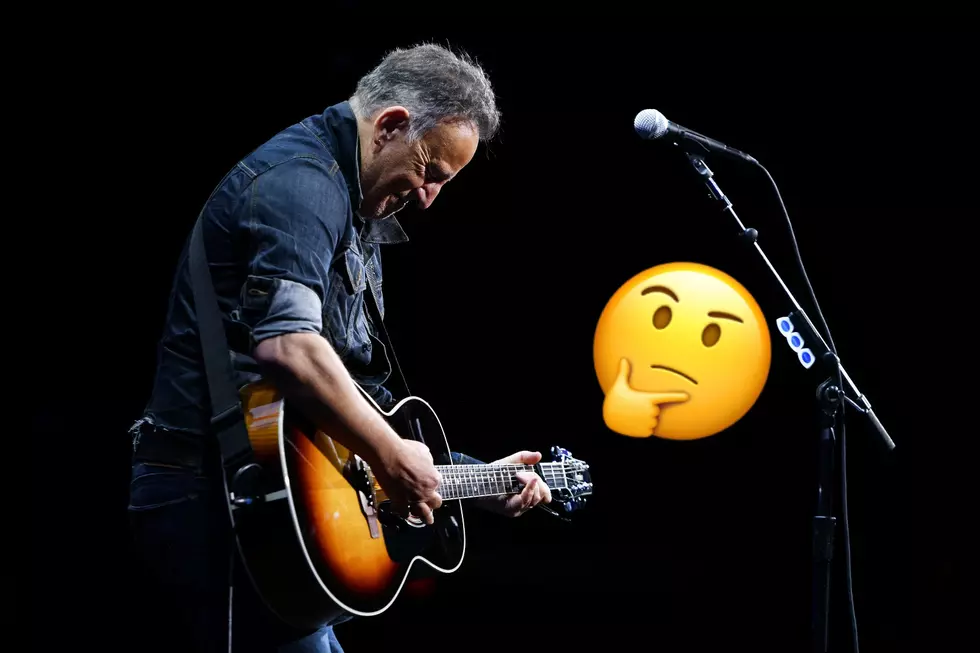
Jeff Deminski: The only time my father said he loved me
I read with interest the story in Vanity Fair about Bruce Springsteen and his upcoming autobiography. Some things I knew, some I didn't. I knew Bruce had a strained relationship with his father and that Bruce's dad was a troubled guy. I also had heard of Bruce's own depression.
What I didn't know (but didn't surprise me) is that Bruce Springsteen's father never told him he loved him. Like so many of us with dads from that older generation, when Bruce would say, "I love you, Pop" all he would get in return is, "Eh, me too." Is it the same thing? For that older generation where men didn't express feelings in any way it was, but for most younger people it isn't.
Now don't get me wrong. In no way do I have a single bad feeling about the fact that my dad would never say he loved me. Because I knew he did. From his actions and the way he lived his life, I know my father loved me very much. So there's no complaint here whatsoever. But there is a story. A story about one small difference between Bruce's dad and mine. Just like Bruce, my whole life I never heard my father say the words, "I love you" except for one time.
That one time was the night he died.
My father only lived to be 62 years old. As the summer of 2000 was ending in the early days of September, my father fell ill. I had already taken a job offer the year before in Detroit and left our more than half a decade run at New Jersey.
So from hundreds of miles away one morning as I was working on a computer in our office I had this sudden unshakable thought out of nowhere that I had to call my father immediately. It was so overwhelming a feeling that I did not even finish an email I was only seconds away from finishing. There wasn't any feeling of impending doom or anything, but rather a strong feeling that I simply needed to call him that I did not question.
I rolled my chair over to the phone and dialed. My father answered with a very groggy voice for late morning. I apologized and asked if I woke him. He only mumbled. Not like him at all. I asked him a few questions and he couldn't answer me. Just mumbles and an odd clucking sound he kept making with his tongue.
My mind reeled. I quickly went down a mental checklist of things to ask him, but it was a very short list. He sounded either like he had had a stroke, or had a severe blow to the head, or a complete break with reality. All the stranger because I had just talked to him a few days before and he seemed fine. I began asking if something were wrong, had something happened, was he in any kind of trouble, had he fallen, had he done something bad; whatever was going on, I begged him to tell me. The most he would get out was, "It's okay, it's okay," then go back to mumbles and clucking.
Finally I told him he had one last chance to tell me what was happening or I would have to hang up and call the police. Nothing.
I called the local police and they sent an officer for a welfare check. A welfare check on a man only 62 years old. The cop called me back and asked me some questions. He told me my father had answered the door wearing only his underwear, something my father would never in a million years have done. Then he asked me if my father's birthday was a date in July.
"No, April 19."
"Well your father seems very confused. Is he normally a little slow?"
Not at all. My father had a 126 IQ and was sharp ever just days before. He told me he was not legally allowed to do anything and I would have to call for an ambulance and somehow convince my father over the phone from Michigan to Pennsylvania where he lived to accept the ride to a hospital.
I got all that done, somehow got through to my father just enough to have him not fight the help. Then I had to sit tight before the show that day just waiting to hear back about the testing. In advance I had already called for airline info and it turned out the only realistic flight I could get to the Wilkes-Barre Scranton, PA area was going to be the next morning, so I sat tight there at the station and still got ready for the show and waited for information. I still remember it was exactly 28 minutes before air time when the call came in.
"Mr. Deminski, I have some very bad news about your father," said a doctor. I appreciated his bluntness, actually. He told me my father appeared to have a glioblastoma, the worst, most aggressive form of brain cancer. They already knew he was terminal. He needed emergency surgery to remove whatever they could of this brain tumor to prolong his life but they could never get it all. You see, it snakes out with tentacles running everywhere throughout the brain.
When I hung up from the call, Bill Doyle was sitting across from me.
"He's dying," I said standing up, then turned around and put my fist right through the wall of the office. But then went on the air and did a regular show up until the final 6 p.m.hour when I spilled the beans about my father and announced I'd be gone for a few days and took calls from folks who either were dealing with or had dealt with something similar. I still in my heart thank those folks. It helped.
My father had his surgery and then had to go through all kinds of rehab in the following days and then was started on radiation treatments. The most time they thought they could buy my dad was one year, maybe 18 months. Not even close. He tried radiation for less than two weeks before he wanted to stop treatment. I was flying back and forth every few days during this time, a few days working the show in Michigan, a few days with my father in Pennsylvania. When he wanted to stop treatment I was in Michigan and had to call him and gently explain to him because of his diminished state that this decision would mean he would die sooner.
He simply said, "I know."
The plan suddenly became that just two days later, he was supposed to be brought by my brother back to my brother and sister-in-law's home in NJ to spend his final months. That was supposed to be on a Saturday morning. So Friday night I was yet again on another airplane heading this time to Newark, NJ to meet up with them at my brother's house the following morning. That was the last night I ever spoke to my father.
This is back when they still had those outrageously priced seatback phones on airplanes with the stiff clunky cords. I called him from the air around 9:30 that Friday night. We spoke only briefly. At the end of that call though, something happened that looking back on it should have told me it was the last time we'd speak and that I would never see him again.
When we were saying goodbye, before I could even say the words my father beat me to it and said, for the very first and very only time, "I love you Jeff."
I told him I loved him too, not realizing that he must have sensed it. He must have innately known that this was his last night. His last chance. I stayed at a hotel that night and hadn't given my brother the name of the hotel because I was getting in so late. The next morning I woke and called my brother who had been trying to figure how to reach me all night and he told me, "Jeff I have bad news, dad's dead. He died last night at 11:30." Just two hours after I spoke to him.
Our dad died exactly one month after his diagnosis.
He never came home to Jersey. The funeral was in Pennsylvania. My father's body rests in a small family cemetery behind a little firehouse just north of Nanticoke, Pennsylvania. I did the eulogy at my father's funeral, to this day the hardest yet proudest thing I've done. I loved my dad dearly. He was far from perfect, but he supported me even when he disagreed with me and always wanted the best for me. He took care of me when I felt the most alone and desperate.
So my father only told me he loved me once, in his very final hours of life. Yet he made me feel loved from the moment I was born. There's more to life and love than words.
— Jeff Deminski
More from New Jersey 101.5
More From New Jersey 101.5 FM









